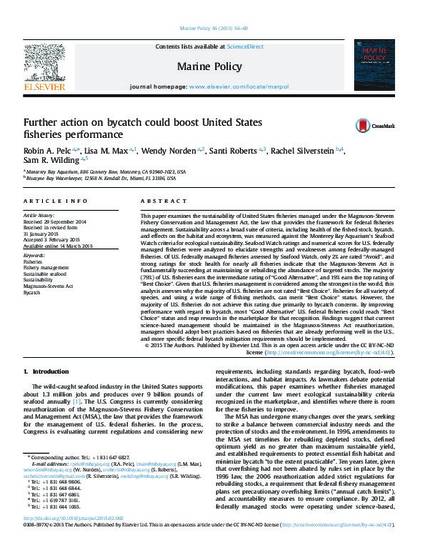
Article
Further action on bycatch could boost United States fisheries performance
Marine Policy
(2015)
Abstract
This paper examines the sustainability of United States fisheries managed under the Magnuson-Stevens Fishery Conservation and Management Act, the law that provides the framework for federal fisheries management. Sustainability across a broad suite of criteria, including health of the fished stock, bycatch, and effects on the habitat and ecosystem, was measured against the Monterey Bay Aquarium׳s Seafood Watch criteria for ecological sustainability. Seafood Watch ratings and numerical scores for U.S. federally managed fisheries were analyzed to elucidate strengths and weaknesses among federally-managed fisheries. Of U.S. federally managed fisheries assessed by Seafood Watch, only 2% are rated “Avoid”, and strong ratings for stock health for nearly all fisheries indicate that the Magnuson-Stevens Act is fundamentally succeeding at maintaining or rebuilding the abundance of targeted stocks. The majority (79%) of U.S. fisheries earn the intermediate rating of “Good Alternative”, and 19% earn the top rating of “Best Choice”. Given that U.S. fisheries management is considered among the strongest in the world, this analysis assesses why the majority of U.S. fisheries are not rated “Best Choice”. Fisheries for all variety of species, and using a wide range of fishing methods, can merit “Best Choice” status. However, the majority of U.S. fisheries do not achieve this rating due primarily to bycatch concerns. By improving performance with regard to bycatch, most “Good Alternative” U.S. federal fisheries could reach “Best Choice” status and reap rewards in the marketplace for that recognition. Findings suggest that current science-based management should be maintained in the Magnuson-Stevens Act reauthorization, managers should adopt best practices based on fisheries that are already performing well in the U.S., and more specific federal bycatch mitigation requirements should be implemented.
Keywords
- Fisheries,
- Fishery management,
- Sustainable seafood,
- Sustainability,
- Magnuson-Stevens Act,
- Bycatch
Disciplines
Publication Date
June, 2015
DOI
10.1016/J.MARPOL.2015.02.002
Citation Information
Robin A. Pelc, Lisa M. Max, Wendy Norden, Santi Roberts, et al.. "Further action on bycatch could boost United States fisheries performance" Marine Policy Vol. 56 (2015) p. 56 - 60 Available at: http://works.bepress.com/robin-pelc/6/
Creative Commons license

This work is licensed under a Creative Commons CC_BY-NC-ND International License.
